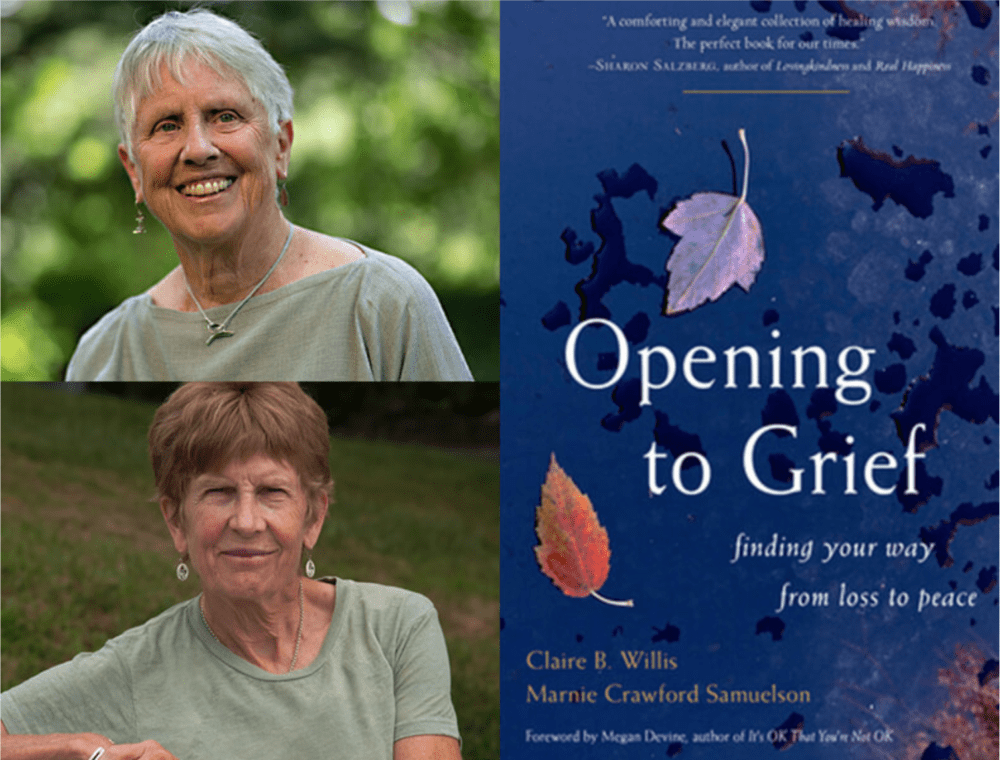Advertisement
One Local Bereavement Counselor Says We're All Grieving Right Now
ResumeHave you had one of those moments since this pandemic started when you just suddenly felt sad? Or maybe you've experienced the massive loss of someone you love? Claire Willis says grief varies widely by person, as does how we handle it.
Willis is the co-founder of the Boston nonprofit Facing Cancer Together. She also regularly leads bereavement and support groups. Her new book, with co-author Marine Crawford Samuelson, is called "Opening To Grief: Finding Your Way From Loss To Peace."
Interview Highlights
On how to process the death toll and loss due to the pandemic:
Claire Willis: "I'm not sure that we actually do. I think we access it depending on how the face of it comes into our life, because each of us is impacted very differently by it. But the enormity of it is pretty hard to take in all at once I think. You know, sometimes in a conversation I'm having with someone else say, "Well, the traffic at Thanksgiving..." and then I realize there's probably not going to be traffic at Thanksgiving. Or, 'I hope to see you.' And then I forget for a moment, it's very hard to take in the enormity — this thing has tendrils that just go forever in our lives and touched so many parts."
On how we recognize grief, both in small and large losses:
Claire Willis: "Well, you know, it's really interesting that you ask me that, because grief — I think often people think of grief as sadness and sorrow, but grief really has as many faces as there are people who are grieving. So it often shows up as impatience, irritability, anxiety is another big expression of grief, anger and rage, which we can often see. Politically, certainly we can see that. Gratitude and sometimes even relief are all expressions of grief. So...people don't always recognize that they're grieving because they think of it in smaller terms of just sadness and sorrow. But it really has as many expressions as there are people who are grieving."
On ways to handle separation from loved ones, especially during the holidays:
Claire Willis: "You know, I think one of the things that I've seen in my bereavement groups is that when people have something in hand writing from someone they love, it helps keep the connection going. Because so much of our correspondence today is text and email and electronic. And I wonder about writing [the caller's father] a note so that on Thanksgiving he has something from you and from other members of the family. And certainly, as always, a phone call or a Zoom connection so he can see you is important if he's savvy in that way."

On anger as a manifestation of grief and the "stages of grief":
Claire Willis: "I think anger is a very common expression of grief because it gives people a sense of agency. And if we're feeling sad or sorrow in that expression of grief, there's a sense of vulnerability and helplessness that we often feel. And I think that can be very uncomfortable for many people to feel that kind of helplessness. So anger is a way that it often expresses itself."
"I want to just say one thing about the stages of grief, because the understanding in our culture that these are stages that Elisabeth Kübler-Ross wrote for people who were grieving isn't actually accurate. They were written for people who were dying, and they got applied to people who were grieving. And one of the things that's happened is people have compared themselves to those stages and end up feeling like they're falling short of how their grief is supposed to look. So grief is never a linear progression. It doesn't go from A-to-Z. It's much more like a ball of yarn that's knotted up and it we have to untangle it. So it's it's it's important to not try and use or overlay a model of grief on your grief because everybody's grief looks different."
On addressing grief:
Claire Willis: "I think the first chapter in the book is called 'Starting with Kindness.' And I think being kind to ourselves and not allowing any internal voices that tell us how this is supposed to look, dictate how we feel about our grief and to treat it as we would a tender friend or a child that was hurting to stay gentle and kind with however it is we're feeling and not overly any of the models of grief or anything that we read about what it should look like on ourselves. I think that's the most important thing to start with."
"Just to counter some of the prevailing myths, most of us have ideas about grief and what it should look like, and we might be under the oppression of some of those concepts. The second thing I would say, and it may sound a little bit counterintuitive, but one of the ways we can build resilience in the face of grief is to try to notice three or four things each day that are right, for which we can be grateful, because our minds are hard wired to notice what's wrong. And if we can hold what's right next to and in equal proportion to what's wrong, it can be very helpful in creating some inner strength and building our resilience to hold our suffering. So one of the things that I often suggest people do is to keep a gratitude journal at the end of the day, because when you commit to that the next day, you start to look for things that are right. And we're not talking about doing this at the expense of what's wrong, but holding what's right alongside."
This segment aired on November 19, 2020.

